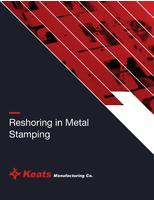Engineered Polyolefin Material exhibits low CLTE values.
Share:
Press Release Summary:
Resistant to dimensional change with varying temperature, SEQUEL® 1828 polyolefin features coefficient of linear thermal expansion (CLTE) of 3.5 x 10(-5) mm/mm/°C. Material exhibits minimal anisotropy, and flow properties enable material to fill large, thin, and complex molds during injection-molding cycles. Able to be completely recycled without significant loss of properties, material suits applications that require tight tolerances, dimensional stability, and impact resistance.
Original Press Release:
New Engineered Polyolefin Exhibits Lowest Coefficient of Linear Thermal Expansion (CLTE) of Any Material Ever Developed by Solvay Engineered Polymers, Inc.
SEQUEL(R) 1828 polyolefin is designed for applications that require tight tolerances, great dimensional stability, excellent impact resistance MANSFIELD, Texas, July 10 -- Solvay Engineered Polymers, Inc., has introduced a new engineered polyolefin material in its SEQUEL(R) 1800 series of products. The new SEQUEL 1828 polyolefin exhibits a coefficient of linear thermal expansion (CLTE) that is the lowest of any material the company has yet developed. Lowest CLTE, greatest dimensional stability CLTE is a measure of how much a finished part will shrink or grow in response to changing temperatures. With a CLTE of 3.5 x 10(-5) mm/mm/ degrees C, the new SEQUEL 1828 material is at least 10% more resistant to changing dimensions than any product in the company's extensive portfolio of thermoplastic polyolefins. The resistance to dimensional change with varying temperature makes the new product ideal for applications that demand tight tolerances. Among the targeted applications are automotive body panels such as fenders, body claddings, or moldings that are in contact or close proximity to a vehicle's sheet metal. Replacements for engineering resins Products in the SEQUEL 1800 series of engineered polyolefins have been successful as replacements for more expensive engineering resins such as ASA (acrylonitrile styrene acrylate) or engineering alloys such as PC/ASA (polycarbonate/ASA) or PC/PBT (polycarbonate/polybutylene terephthalate). "Several carmakers have expressed a desire for a thermoplastic material with excellent stiffness and the dimensional stability of aluminum, which has a CLTE of approximately 2.0 x 10(-5) mm/mm/ degrees C," says Craig Abernethy, an OEM Marketing Manager at Solvay Engineered Polymers. "The new SEQUEL 1828 material can now compete with 30% glass-filled polyurethane (TPU). It may even merit consideration against glass-filled nylon in some applications. In addition, this engineered polyolefin exhibits less anisotropy than glass- filled materials, so its shrink and CLTE performance are not so dependent on directional orientation." Among the advantages the new material enjoys over glass-filled materials are its efficient and economical processing characteristics. "In injection molding," points out Abernethy, "glass-filled products exert wear and tear not only on molds, but also on material-handling equipment, driving up costs." The excellent flow properties of this new material mean it can easily fill larger, thinner, and more complex molds, reducing scrap rates as well as injection-molding cycle times. The material can also be completely recycled without significant loss of properties - a benefit shared by all of the company's thermoplastic polyolefin products. Savings from design and manufacturing "Reduced maintenance on manufacturing equipment can result in direct savings," Abernethy adds. "Additional indirect economies accrue from the ability of the material to produce thinner parts, thereby saving weight, which is particularly important to the automotive industry. In addition, designers have more opportunities to consolidate parts in a more complex design." Experience, resources, and global support Solvay Engineered Polymers, Inc., is a leader in the development and manufacture of engineered polyolefin compounds, thermoplastic polyolefins (TPOs), and thermoplastic elastomers (TPEs). The company is headquartered in Mansfield, Texas, with sales and marketing operations and an Applications Development Center in Auburn Hills, Michigan. Distribution and R&D facilities are located in Mansfield and Grand Prairie, Texas. The Texas sites are the primary manufacturing locations, with additional resources in Europe and Asia. A facility in Shirley, Massachusetts is dedicated to the production of the company's line of TPEs. The production and engineering operations of Solvay Engineered Polymers are certified to the standards of ISO/TS 16949:2002 for quality systems. More information about its products and capabilities can be found at solvayengineeredpolymers.com/. Solvay Engineered Polymers is a member of the Solvay Group, an international chemical and pharmaceutical group headquartered in Brussels, Belgium. The Group employs some 29,000 people in 50 countries. In 2006, consolidated sales amounted to EUR 9.4 billion, generated by three sectors of activity: Chemicals, Plastics, and Pharmaceuticals. Solvay is listed on the Euronext stock exchange in Brussels (Euronext: SOLB.BE; Bloomberg: SOLB.BB; Reuters: SOLBt.BR). Details are available at www.solvay.com/. CONTACT: Product Information, Craig Abernethy, OEM Marketing Manager, +1-248-391-9573, craig.abernethy@solvay.com of Solvay Engineered Polymers, Inc.




